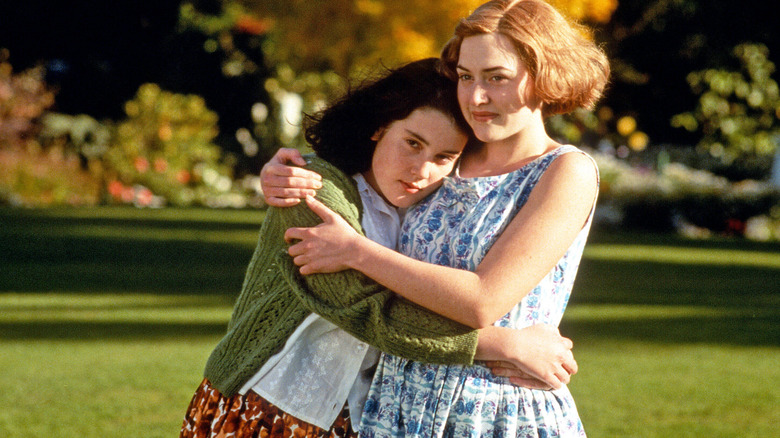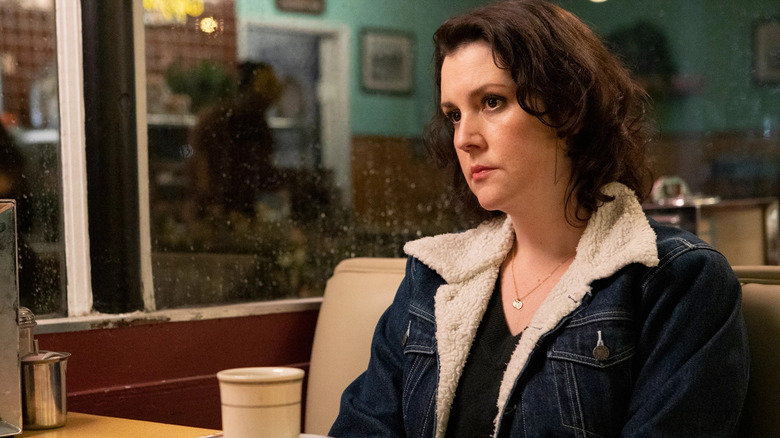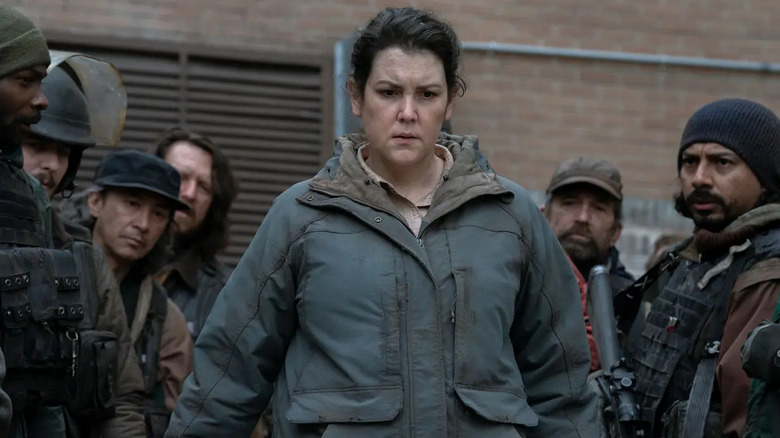Peter Jackson's Heavenly Creatures Made Melanie Lynskey Scary Before Yellowjackets And The Last Of Us Made It Cool
Melanie Lynskey often plays complex female roles that defy societal norms, most recently her dark turns in "Yellowjackets" and "The Last of Us." But before Lynskey played a quietly fierce plane survivor or ruthless leader in a zombie apocalypse, she gave a bone-chilling performance in Peter Jackson's "Heavenly Creatures," her screen debut alongside the equally talented Kate Winslet.
Lynskey was chosen from 500 New Zealand schoolgirls for the role of Pauline Parker, a glum outcast who engages in an obsessive friendship with an intelligent English rose named Juliet Hulme. The imaginative teen girls share eventually conspire to kill Pauline's mother with a brick.
"We were looking for an actor who could capture the quiet intensity of Pauline Parker — who was by all accounts, a fiercely passionate introvert," says the "Heavenly Creatures" screenwriter Fran Walsh. "We knew immediately that she was right for the role. Mel was a natural in front of the camera, but more than this, she understood the complexities of Pauline's character and she brought tremendous sympathy to the role" (via Stuff).
Although she had no proper acting training, Lynskey's performance is astonishingly nuanced and passionate. Her combination of unhinged teen delirium and measured malice is chilling. Pauline is a career-defining role that set the standard for Lynskey's transfixing on-screen presence, the terror of her unwavering resolve that she brings to her roles in "Yellowjackets" and "The Last of Us." Watching 16-year-old Melanie Lynskey in "Heavenly Creatures," you can see how she learned to detail her characters' hidden depths.
Yellowjackets
Just as "Yellowjackets" gradually builds its gripping mystery, Lynskey is an expert at subtly modulating her performance. She is like a volcano — a simmering rage beneath her smooth, deliberate surface just waiting to erupt. Much like Pauline, Shauna has a hidden dark side that clashes with her suburban life, a secret desire for sexual and violent transgressions. Shauna indulges in reckless behavior such as masturbating to a photo of her daughter's boyfriend, getting drunk, and cheating on her husband. She can also bone a carcass with terrifying ease.
In "Heavenly Creatures," the young Lynskey established that she could carry such roles. Pauline's wildness unleashes a greater force, as if she were an animal locked in a cage that is finally set free. Pauline is another female character who opposes traditional femininity with her kinky humor when creating lecherous stories with Juliet about a sexual and violent royal family.
Lynskey solidifies how well she can can create vicious characters, plainly spitting out wicked lines such as "I am writing a little of this up on the morning before the death [of her mother]. I felt very excited and the night-before-Christmas-ish last night." Her phony sweetness when she offers her mother a pastry at tea time, knowing this will be her last meal, is unsettling. It comes from the same dark place as her sharp delivery of "I don't even like my daughter" during a brunch scene in "Yellowjackets."
The Last of Us
Showrunner Craig Mazin says in the official "The Last of Us" podcast that the idea for Kathleen's original character was "What if a kindergarten teacher were in charge of the terror of the French Revolution?" Her calm and gentle voice belies her icy ruthlessness as she murders her family doctor without hesitation and waves off Henry's brother dying because "children die all the time."
/Film writer Valerie Ettenhofer praises Lynskey for imbuing her "delightfully villainous character" with "steely resolve, decisive wrath, and a glimmer of empathy even with her limited screen time." All of these traits are found in her "Heavenly Creatures" performance, particularly in the series of extreme close-ups throughout the film. The sullen schoolgirl has a firm gaze, as if she is shooting poison daggers from her upturned eyes. Beneath her wild mane of curls, Pauline's mouth is pinched in bitter annoyance. It's a stare with the kind of pointed anger that Wednesday Addams would be jealous of. With this chilling look, Lynskey powerfully communicates Pauline's silent rebellion against her oppressive mother and the rules of 1950s society.
Valerie Ettenhofer also touches on what is fundamental to all of Melanie Lynskey's performances: "[S]he nearly always projects a level of warmth that makes her impossible to fully root against." Both Pauline and Kathleen commit unspeakable acts of violence, but their actions feel authentic and even somewhat understandable through Lynskey's steady focus and passion.
As just a teenage girl in "Heavenly Creatures," Melanie Lynskey says so much with so little. She demonstrates the keen control of turbulent feelings that she would bring to her future roles. She proves that she was capable of playing such twisted characters all along.


